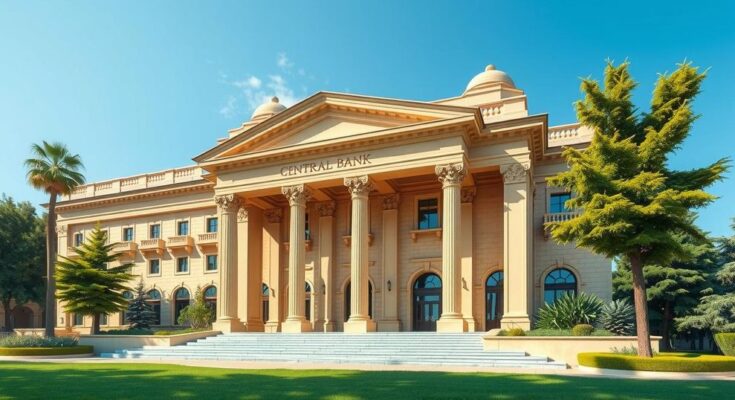The U.S. is intervening in Lebanon’s selection of a new Central Bank Governor to fight corruption and limit Hezbollah’s impact. This action is part of broader efforts to address Lebanon’s significant economic crisis. Several candidates are under review, and the incoming governor will be crucial for implementing necessary reforms for financial aid.
The United States intends to actively participate in the selection of a new Governor for Lebanon’s Central Bank, aiming to reduce corruption and prevent Hezbollah from accessing Lebanon’s banking system. This marks an unprecedented involvement by Washington as Lebanon continues to confront a severe financial crisis that has lasted over five years, resulting in an economic collapse.
The U.S. interest in this appointment underscores its efforts to weaken Hezbollah, an Iran-supported group that lost influence in Lebanon after recent Israeli military actions. Following this, Joseph Aoun, a candidate favored by the U.S., was elected as president, leading to the formation of a government that excluded Hezbollah. This government now faces the task of appointing a suitable candidate for the Central Bank Governor, a role currently overseen by an interim governor since July 2023.
U.S. officials are evaluating multiple candidates for the governorship, with discussions having taken place in Washington and Beirut under confidentiality. Meetings with these candidates focused on their proposals to combat terrorism financing within Lebanon and their stance towards Hezbollah. However, the State Department, the White House, and the Lebanese Prime Minister’s office have refrained from commenting on the U.S. involvement.
A U.S. official described the initiative as part of regular diplomacy, yet emphasized that the criteria for candidates remain strict: no affiliations with Hezbollah or involvement in corruption. This reflects the urgent need for economic reforms in Lebanon, where corruption and mismanagement have devastated the economy.
Candidates like former minister Camille Abu Suleiman, investment head Firas Abi Nassif, and IMF’s Jihad Azour are among those considered for the governor’s position. The new governor’s role will be pivotal in advancing economic and financial reforms, which the current Lebanese government is committed to pursue to navigate out of the ongoing financial crisis that commenced in 2019.
The new government aims to reignite negotiations with the International Monetary Fund for vital financial aid, contingent upon requisite economic reforms. International support for Lebanon’s recovery is tied to these reforms, particularly after the extensive damage inflicted during last year’s Israeli military operations. Furthermore, discussions with Saudi officials regarding potential candidates are reportedly ongoing.
The incoming governor will succeed Wassim Mansouri, who temporarily managed the Central Bank following Riad Salameh’s controversial departure after three decades. Salameh’s tenure ended in scandal, with sanctions imposed by the U.S., UK, and Canada for corruption and illicit financial gains. Consequently, Lebanon found itself on the Financial Action Task Force’s grey list due to ongoing issues related to terrorism financing and money laundering.
In summary, the United States is set to play a significant role in the appointment of Lebanon’s new Central Bank Governor to combat corruption and restrict Hezbollah’s influence within the banking system. As Lebanon continues to face an economic crisis, the next governor will be essential in implementing necessary reforms. This intervention illustrates Washington’s continued efforts to stabilize Lebanon while maintaining scrutiny over the candidates to ensure accountability and integrity in financial governance.
Original Source: www.jordannews.jo




